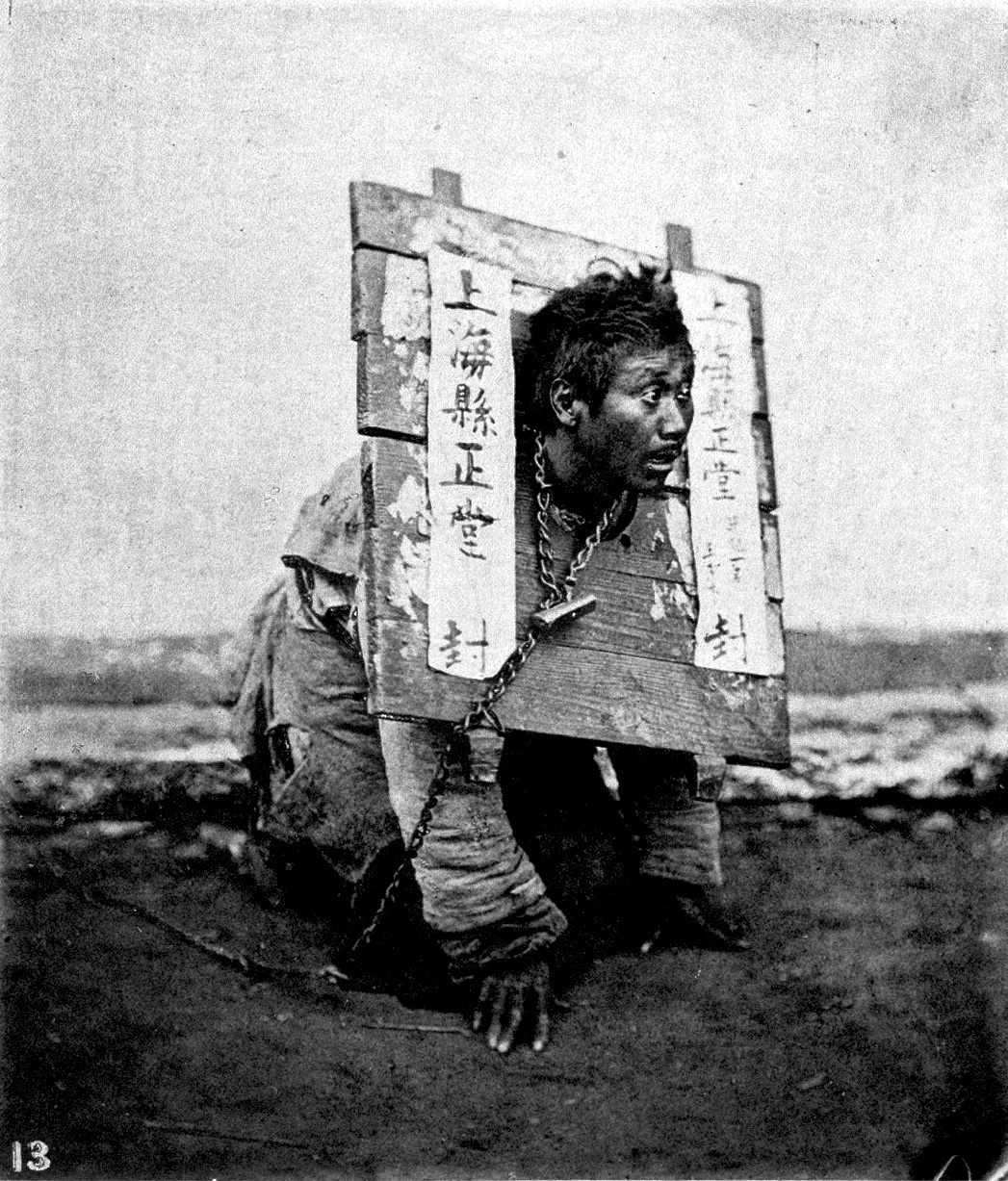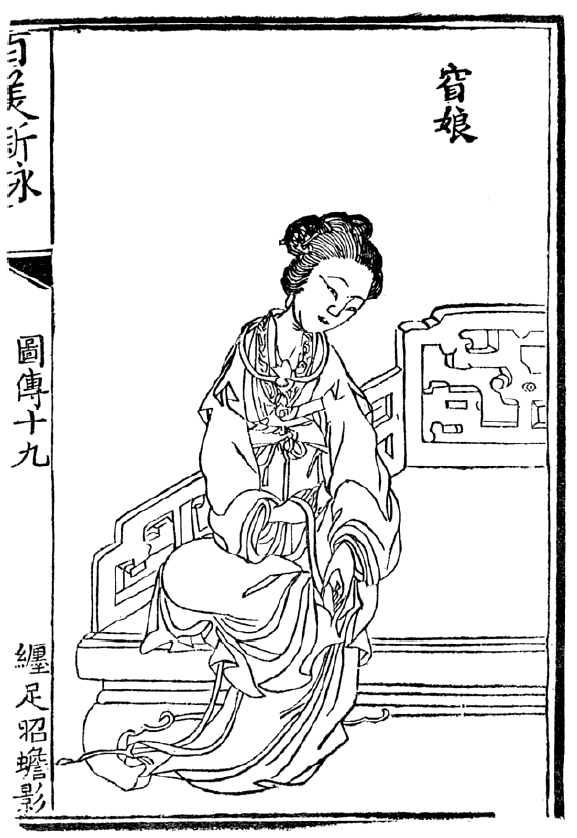|
The Golden Cangue
''The Golden Cangue'' (金鎖記) is a 1943 Chinese novella by Eileen Chang. The author's own English translation appeared in the anthology ''Modern Chinese Stories and Novellas: 1919–1949'' (1981) published by Columbia University Press. Fu Lei was an enthusiastic critic of the story, while C. T. Hsia considered it "the greatest novelette in the history of Chinese literature". Later the story was rewritten as the novel ''The Rouge of the North'' (怨女). Plot ''The Golden Cangue'' illustrates the decadence of the idle rich. Set in Shanghai, the novelette unfolds the degeneration of the heroine, Qi Qiao, and her family. The golden cangue symbolizes the destructiveness of the protagonist. Qi Qiao the main protagonist is the daughter of a sesame oil shopkeeper, she is forced to marry family Chiang for wealth. She's a benefit-finder in her life, but there are so many destructive elements in her life. She lived in an environment of denial. Originally, Qi Qiao was to be a concub ... [...More Info...] [...Related Items...] OR: [Wikipedia] [Google] [Baidu] |
Eileen Chang
Eileen Chang ( zh, t=張愛玲, s=张爱玲, first=t, w=Chang1 Ai4-ling2, p=Zhāng Àilíng;September 30, 1920 – September 8, 1995), also known as Chang Ai-ling or Zhang Ailing, or by her pen name Liang Jing (梁京), was a Chinese-born American essayist, novelist, and screenwriter. She is a well-known feminist in Chinese history, known for portraying life in the 1940s Shanghai and Hong Kong. Chang was born with an aristocratic lineage and educated bilingually in Shanghai. She gained literary prominence in Japanese-occupied Shanghai between 1943 and 1945. However, after the Communist takeover of China, she fled the country. In the late 1960s and early 1970s, she was rediscovered by scholars such as C. T. Hsia and Shui Jing. Together with the re-examination of literary histories in the post-Mao era during the late 1970s and early 1980s, she rose again to literary prominence in Taiwan, Hong Kong, Mainland China, and the Chinese diaspora communities."Chang, Eileen (Zhang Aili ... [...More Info...] [...Related Items...] OR: [Wikipedia] [Google] [Baidu] |
Peking Opera
Peking opera, or Beijing opera (), is the most dominant form of Chinese opera, which combines music, vocal performance, mime, dance and acrobatics. It arose in Beijing in the mid-Qing dynasty (1644–1912) and became fully developed and recognized by the mid-19th century. The form was extremely popular in the Qing court and has come to be regarded as one of the cultural treasures of China. Major performance troupes are based in Beijing, Tianjin and Shanghai. The art form is also preserved in Taiwan, where it is also known as (). It has also spread to other regions such as the United States and Japan. Peking opera features four main role types, '' sheng'' (gentlemen), ''dan'' (women), '' jing'' (rough men), and '' chou'' (clowns). Performing troupes often have several of each variety, as well as numerous secondary and tertiary performers. With their elaborate and colorful costumes, performers are the only focal points on Peking opera's characteristically sparse stage. They use the ... [...More Info...] [...Related Items...] OR: [Wikipedia] [Google] [Baidu] |
Clifton Ko
Clifton Ko (; born 6 August, 1958) is a Hong Kong film director, actor, producer and scriptwriter. Background Clifton Ko graduated from Kwun Tong Maryknoll College, and entered TV and film industry in late 1970s, firstly worked with director Clifford Choi. In this period he wrote Choi's ''No U-Turn'' (1981) and ''Teenage Dreamers'' (), and John Woo's comedy ''Once a Thief''. In 1982 Ko entered Raymond Wong (film presenter), Raymond Wong's the newly founded Cinema City & Films Co., and directed his first film ''The Happy Ghost'' in 1984. The film series, like all his major works, is a slapstick comedy with moral teaching, family value, and optimism. Ko, together with the company, is prolific in making "Chinese New Year movies". Important titles include family comedy series ''It's a Mad, Mad, Mad World'' (beginning in 1987); ''Chicken and Duck Talk'', a collaboration with comedian/writer Michael Hui; and ensemble comedy series ''All's Well, Ends Well'' (beginning in 1992); and ''I ... [...More Info...] [...Related Items...] OR: [Wikipedia] [Google] [Baidu] |
Ann Hui
Ann Hui On-wah, (; born 23 May 1947) is a film director, producer, screenwriter and actress from Hong Kong who is one of the most critically acclaimed filmmakers of the Hong Kong New Wave. She is known for her films about social issues in Hong Kong which include: literary adaptations, martial arts, semi-autobiographical works, women's issues, social phenomena, political changes, and thrillers. She served as the president of the Hong Kong Film Directors' Guild from 2004 to 2006. Hui has won numerous awards. She won Best Director at the Golden Horse Awards three times (1999, 2011, 2014); Best Film at the Asia Pacific Film Festival; and Best Director at the Hong Kong Film Awards six times (1983, 1996, 2009, 2012, 2015, 2018). Only two films have won a Grand Slam (Best Picture, Best Director, Best Screenplay, Best Actor, and Best Actress) at the Hong Kong Film Awards; they are '' Summer Snow'' and ''A Simple Life'', both directed by Ann Hui. She was honored for her lifetime accom ... [...More Info...] [...Related Items...] OR: [Wikipedia] [Google] [Baidu] |
Shanghai Dramatic Arts Centre
Shanghai Dramatic Arts Centre () is a professional theatrical company based in Shanghai, China, founded on January 23, 1995 after the merger of Shanghai's two largest theatres, the Shanghai People's Art Theatre () and the Shanghai Youth Drama Troupe (). Its founders are Xia Yan, Huang Zuolin and Xiong Foxi. Currently, its contracted actors include Michael Chen, Ryan Cheng, Xu Zheng and Ma Yili Ma Yili (, born 29 June 1976) is a Chinese actress. Ma ranked 42nd on ''Forbes'' China Celebrity 100 list in 2019. Early life Ma was born in Hongkou District, Shanghai on June 29, 1976, with her ancestral home in Rudong County, Nantong, Jiangsu .... References External links * {{DEFAULTSORT:Shanghai Dramatic Arts Centre 1995 establishments in China Theatre companies in Shanghai Organizations based in Shanghai Culture in Shanghai ... [...More Info...] [...Related Items...] OR: [Wikipedia] [Google] [Baidu] |
Huang Shuqin
Huang Shuqin (9 September 1939 – 21 April 2022) was a Chinese film director known for her film ''Woman, Demon, Human'' (1987). Widely considered the first feminist Chinese film by critics and scholars,Kang, Kai. "Beyond New Waves: Gender and Sexuality in Sinophone Women‘s Cinema from the 1980s to the 2000s." PhD Dissertation, University of California, 2015. ''Woman, Demon, Human'' garnered universal critical acclaim, as well as a nomination for Best Director and a win for Best Writing at the 8th Golden Rooster Awards. Although her film career didn't take off until she was well into her forties, she was regarded as one of China's most talented female directors, with a career spanning nearly three decades. Huang was also known for the popular television series ''Fortress Besieged'' (1990) and ''Sinful Debt'' (1995) and she received awards and nominations in both television and film mediums . Early life and education Huang Shuqin was born 9 September 1939 in Shanghai to film ... [...More Info...] [...Related Items...] OR: [Wikipedia] [Google] [Baidu] |
Wang Anyi
Wang Anyi (born 6 March 1954) is a Chinese writer, vice-chair of the China Writers Association since 2006, and professor in Chinese Literature at Fudan University since 2004. Wang widely write novels, novellas, short stories and essays with diverse themes and topics. The majority of her works are set in Shanghai, where she lived and worked for the majority of her life. Wang also regularly writes about the countryside in Anhui, where she was " sent down" during the Cultural Revolution. Her works have been translated into English, German and French, and studied as zhiqing (educated youth), xungen (roots-searching), Haipai (Shanghai style), and dushi (urban, cosmopolitan) literature. Early life Wang was born in Nanjing in 1954, but moved to Shanghai with her mother when she was a year old. Under the influence of her parents, she liked literature very much in childhood. After the Cultural Revolution, her parents were sent to labor camps. She read a large number of foreign works, In ... [...More Info...] [...Related Items...] OR: [Wikipedia] [Google] [Baidu] |
Foot Binding
Foot binding, or footbinding, was the Chinese custom of breaking and tightly binding the feet of young girls in order to change their shape and size. Feet altered by footbinding were known as lotus feet, and the shoes made for these feet were known as lotus shoes. In late imperial China, bound feet were considered a status symbol and a mark of feminine beauty. However, footbinding was a painful practice that limited the mobility of women and resulted in lifelong disabilities. The prevalence and practice of footbinding varied over time and by region and social class. The practice may have originated among court dancers during the Five Dynasties and Ten Kingdoms period in 10th-century China, and gradually became popular among the elite during the Song dynasty. Footbinding eventually spread to lower social classes by the Qing dynasty (1636–1912). Manchu emperors attempted to ban the practice in the 17th century, but failed. In some areas, footbinding raised marriage prospects. It ... [...More Info...] [...Related Items...] OR: [Wikipedia] [Google] [Baidu] |
Columbia University Press
Columbia University Press is a university press based in New York City, and affiliated with Columbia University. It is currently directed by Jennifer Crewe (2014–present) and publishes titles in the humanities and sciences, including the fields of literary and cultural studies, history, social work, sociology, religion, film, and international studies. History Founded in May 1893, In 1933 the first four volumes of the ''History of the State of New York'' were published. In early 1940s revenues rises, partially thanks to the ''Encyclopedia'' and the government's purchase of 12,500 copies for use by the military. Columbia University Press is notable for publishing reference works, such as ''The Columbia Encyclopedia'' (1935–present), ''The Columbia Granger's Index to Poetry'' (online as ''The Columbia World of Poetry Online'') and ''The Columbia Gazetteer of the World'' (also online) and for publishing music. First among American university presses to publish in electronic ... [...More Info...] [...Related Items...] OR: [Wikipedia] [Google] [Baidu] |
Cangue
A cangue () or tcha is a device that was used for public humiliation and corporal punishment in East AsiaJamyang NorbuFrom Darkness to Dawn, site ''Phayul.com'', May 19, 2009. and some other parts of Southeast Asia until the early years of the twentieth century. It was also occasionally used for or during torture. Because it restricted a person's movements, it was common for people wearing cangues to starve to death as they were unable to feed themselves. The word "cangue" is French, from the Portuguese "canga," which means yoke, the carrying tool has also been used to the same effect, with the hands tied to each arm of the yoke. Frequently translated as pillory, it was similar to that European punishment except that the movement of the prisoner's hands was not as rigorously restricted and that the board of the cangue was not fixed to a base and had to be carried around by the prisoner. At times, the cangue was used as a general means of restraining prisoners along with manacle ... [...More Info...] [...Related Items...] OR: [Wikipedia] [Google] [Baidu] |


.jpg)


.jpg)
